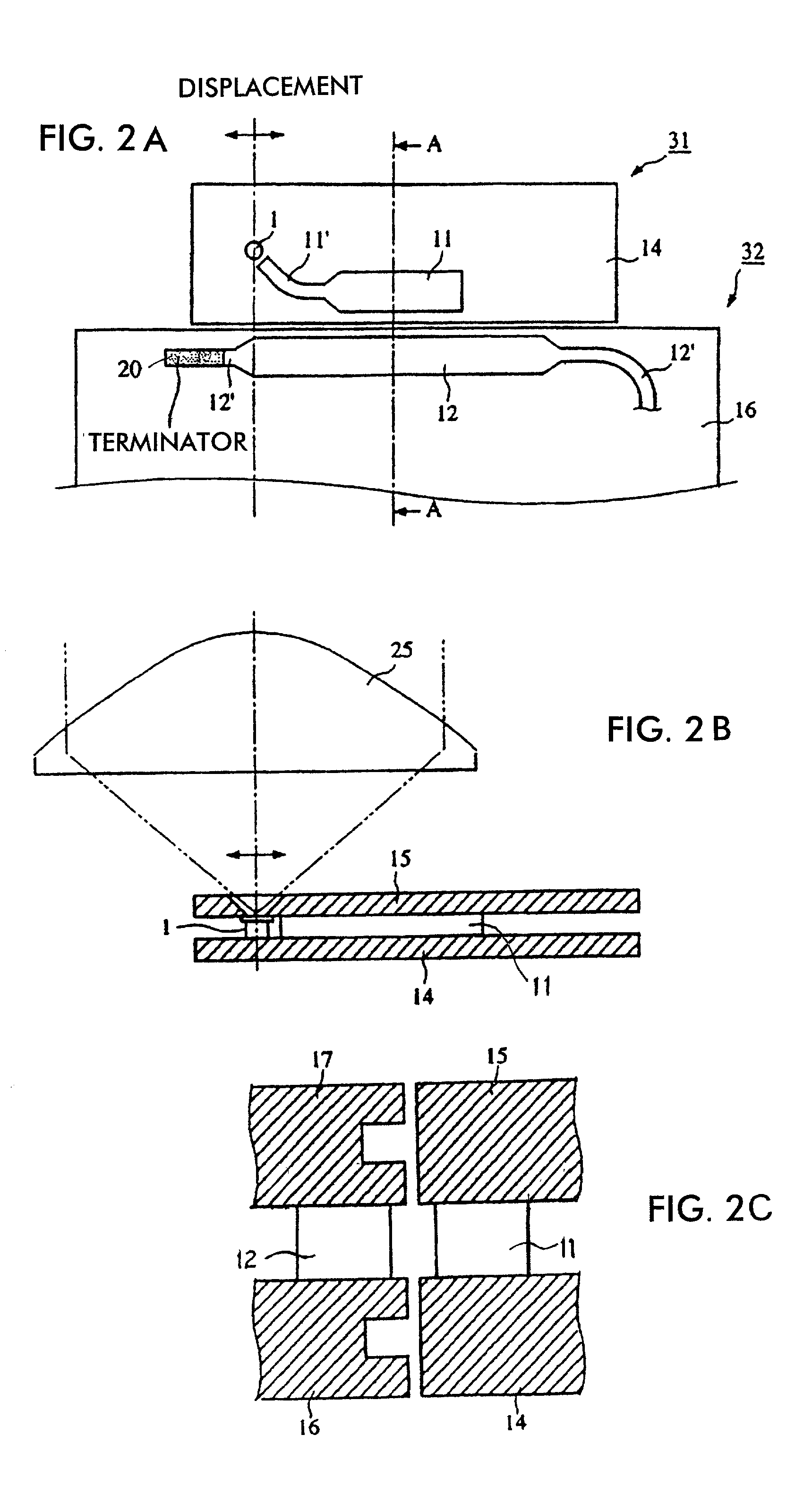Antenna device, communication apparatus and radar module
a technology of communication apparatus and antenna, applied in the direction of antenna details, antennas, antennas, etc., can solve the problems of significant deterioration in the side-lobe level, reducing the gain of the antenna, and unable to perform scanning in a wide angular range, etc., to achieve the effect of improving the directional accuracy of each dielectric lens and facilitating the assembly of dielectric lenses
- Summary
- Abstract
- Description
- Claims
- Application Information
AI Technical Summary
Benefits of technology
Problems solved by technology
Method used
Image
Examples
first embodiment
[0043] With reference to FIGS. 1 to 3, a description will be given of the structure of an antenna device according to the present invention.
[0044] FIG. 1 illustrates the main part of the antenna device and an example of the displacement of a primary radiator obtained when performing beam scanning. Actually, the antenna device has a single primary radiator. The reference numerals 1a to 1i shown in FIG. 1 indicate the positions of a primary radiator 1 when beam scanning is performed. As will be described below, a primary radiator 1 is displaced with a mechanism in which a rotary motor or a linear motor is used as a driving source. The reference characters Ba to Bi represent the directional patterns of the antenna obtained when the primary radiator 1 is in the positions 1a to 1i. The patterns will simply be referred to as beams below.
[0045] The reference numerals 24, 25, and 26 denote dielectric lenses converging electromagnetic waves whose radiation intensities are distributed in a re...
second embodiment
[0056] Next, an antenna device according to the invention will be described with reference to FIG. 4.
[0057] In the first embodiment, in the linear displacement of the primary radiator, by geometrically changing the position of the primary radiator with respect to the center of each of the dielectric lenses, the direction in which a beam is oriented is changed. However, in the embodiment shown in FIG. 4, the primary radiator 1 is rotationally displaced. In other words, for example, when the radiation pattern (hereinafter referred to as a radiated beam) of an electromagnetic wave radiated from the primary radiator 1 is represented by Be', the dielectric lens 25 converges the radiated beam to form a beam Be in the forward direction. When the primary radiator 1 rotates at a predetermined angle in a clock-wise direction in the figure and a beam radiated from the primary radiator is represented by Bf', a beam radiated in the forward direction via the dielectric lens 25 is represented by B...
third embodiment
[0060] Next, an antenna device according to the invention will be described with reference to FIGS. 5A and 5B.
[0061] In each of the first and second embodiments, the dielectric lenses placed on the right and left are arranged in such a manner that the central axes of the three dielectric lenses pass near the center of the scanning range of the primary radiator or near the position of the primary radiator. However, as shown in FIG. 5A, the dielectric lenses may be arranged in such a manner that the central axes of the dielectric lenses 24, 25, and 26 are parallel to each other.
[0062] In addition, in each of the first and second embodiments, the three dielectric lenses have substantially equal aperture sizes. However, as shown in Fig. 5B, for example, the aperture or opening of the dielectric lens 25 in the forward direction may be larger than the apertures of the remaining dielectric lenses 24 and 26. In this manner, by making the aperture of the dielectric lens 25 used for forming a...
PUM
 Login to View More
Login to View More Abstract
Description
Claims
Application Information
 Login to View More
Login to View More - R&D
- Intellectual Property
- Life Sciences
- Materials
- Tech Scout
- Unparalleled Data Quality
- Higher Quality Content
- 60% Fewer Hallucinations
Browse by: Latest US Patents, China's latest patents, Technical Efficacy Thesaurus, Application Domain, Technology Topic, Popular Technical Reports.
© 2025 PatSnap. All rights reserved.Legal|Privacy policy|Modern Slavery Act Transparency Statement|Sitemap|About US| Contact US: help@patsnap.com



